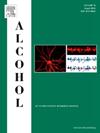妊娠期胆碱补充剂可改善断奶羔羊在妊娠头三个月暴饮暴食导致的T迷宫逆转学习障碍。
IF 2.9
4区 医学
Q3 PHARMACOLOGY & PHARMACY
引用次数: 0
摘要
在胎儿酒精谱系障碍(FASD)的啮齿类动物模型中,认知障碍与 T 迷宫空间倒转学习能力受损有关。大鼠研究表明,在酒精暴露的发育期补充胆碱可改善空间逆转缺陷。本研究测试了产前补充胆碱的益处是否能在绵羊妊娠头三个月暴饮暴食模型中得到证实。研究测试了两个假设:1)酒精暴露会导致T迷宫位置辨别的逆转缺陷;2)妊娠期膳食中补充胆碱会改善这些缺陷。交配母羊被分配到七个组中的一组--正常对照组(NC)或六个输液治疗组中的一组:生理盐水对照组(SC;等渗生理盐水)、生理盐水对照组加胆碱组(SC-CH;等渗生理盐水加胆碱,妊娠期每天口服 10 毫克/千克)、暴饮暴食酒精组(BA;每次输液 1.大剂量酒精(HBA;2.5 克/千克/天酒精)或大剂量酒精加胆碱(HBA-CH;2.5 克/千克/天酒精加胆碱)。酒精输注模拟了相当于妊娠头三个月(妊娠第 4-41 天)的周末酗酒模式。T 型迷宫训练从 12 周龄开始,每天训练 5 天/周。羔羊先接受5天的习惯性训练,然后进行5天的位置辨别训练(每天3次,每次间隔3小时,受试者随机分配强化侧)。然后对羔羊进行为期 10 天的反转任务训练。在习得过程中,各组之间没有差异。酒精会损害羔羊的逆转学习能力,而在 HBA-CH 组中,补充胆碱可减轻这些缺陷。这些结果表明,在绵羊 FASD 模型中,母体膳食胆碱补充剂可改善或预防某些执行功能障碍。本文章由计算机程序翻译,如有差异,请以英文原文为准。
Gestational choline supplementation ameliorates T-maze reversal learning deficits induced by first trimester binge alcohol exposure in weanling lambs
In rodent models of fetal alcohol spectrum disorders (FASD), cognitive deficits are implicated in impaired T-maze spatial reversal learning. Rat studies have indicated supplemental administration of choline during the developmental period of alcohol exposure can ameliorate spatial reversal deficits. This study tested whether beneficial effects of prenatal choline supplementation could be confirmed in a sheep model of binge exposure in the first trimester equivalent. Two hypotheses were tested: 1) alcohol exposure would produce deficits in reversal of a T-maze position discrimination; and 2) gestational dietary supplementation of choline would ameliorate those deficits. Mated ewes were assigned to one of seven groups—a normal control (NC) group or one of six infusion treatment groups: saline control (SC; isotonic saline), saline control plus choline (SC-CH; isotonic saline plus choline, 10 mg/kg administered orally throughout each day of gestation), binge alcohol (BA; 1.75 g/kg alcohol per infusion day), binge alcohol plus choline (BA-CH; 1.75 g/kg/day alcohol plus choline), heavy binge alcohol (HBA; 2.5 g/kg/day alcohol), or heavy binge alcohol plus choline (HBA-CH; 2.5 g/kg/day alcohol plus choline). The alcohol infusions modeled a weekend binge drinking pattern over the first trimester-equivalent (gestational day 4–41). T-maze training began at 12 weeks of age, with daily sessions occurring 5 days/week. Lambs were given five days of habituation training, followed by five days of position discrimination training (3 trials per daily session, intertrial interval of 3 h, reinforced side randomly assigned across subjects). Lambs were then given 10 days of training on the reversal task. There was no difference among groups during acquisition. Alcohol impaired reversal learning, and choline supplementation mitigated these deficits in the HBA-CH group. These results suggest that maternal dietary choline supplementation can ameliorate or prevent some impairments of executive function in a sheep model of FASD.
求助全文
通过发布文献求助,成功后即可免费获取论文全文。
去求助
来源期刊

Alcohol
医学-毒理学
CiteScore
4.60
自引率
4.30%
发文量
74
审稿时长
15.6 weeks
期刊介绍:
Alcohol is an international, peer-reviewed journal that is devoted to publishing multi-disciplinary biomedical research on all aspects of the actions or effects of alcohol on the nervous system or on other organ systems. Emphasis is given to studies into the causes and consequences of alcohol abuse and alcoholism, and biomedical aspects of diagnosis, etiology, treatment or prevention of alcohol-related health effects.
Intended for both research scientists and practicing clinicians, the journal publishes original research on the neurobiological, neurobehavioral, and pathophysiological processes associated with alcohol drinking, alcohol abuse, alcohol-seeking behavior, tolerance, dependence, withdrawal, protracted abstinence, and relapse. In addition, the journal reports studies on the effects alcohol on brain mechanisms of neuroplasticity over the life span, biological factors associated with adolescent alcohol abuse, pharmacotherapeutic strategies in the treatment of alcoholism, biological and biochemical markers of alcohol abuse and alcoholism, pathological effects of uncontrolled drinking, biomedical and molecular factors in the effects on liver, immune system, and other organ systems, and biomedical aspects of fetal alcohol spectrum disorder including mechanisms of damage, diagnosis and early detection, treatment, and prevention. Articles are published from all levels of biomedical inquiry, including the following: molecular and cellular studies of alcohol''s actions in vitro and in vivo; animal model studies of genetic, pharmacological, behavioral, developmental or pathophysiological aspects of alcohol; human studies of genetic, behavioral, cognitive, neuroimaging, or pathological aspects of alcohol drinking; clinical studies of diagnosis (including dual diagnosis), treatment, prevention, and epidemiology. The journal will publish 9 issues per year; the accepted abbreviation for Alcohol for bibliographic citation is Alcohol.
 求助内容:
求助内容: 应助结果提醒方式:
应助结果提醒方式:


